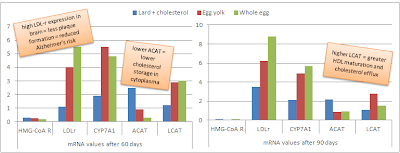 |
| Image 1: You better make sure you don't miss out on these delicious heart- and brain-healthy cholesterol bombs. |
Surprising(?) -9% belly-fat reduction on whole egg diet
In their 60 to 90 day experiment, the Chinese researchers put a group of 8-week old Sprague-Dawley rats (n=18 for each group) on dietary regimen which differed in either cholesterol content (control vs. experimental groups) or the source of dietary cholesterol, i.e. 17.5% lard + synthetic cholesterol, 31.25% freeze dried egg yolk or 55.56% whole egg powder.
 |
| Figure 1: Composition of the control and the three experimental diets (adapted from Yang. 2012) |
 |
| Figure 2: Body weight gain, food intake, food efficiency (food intake / weight gain) and relative visceral fat weight (per body weight) in Sprague Dawley rats after 60 and 90 days on experimental diets; data expressed relative to control group on standard rodent chow (data calculated based on Yang. 2012) |
55.56% whole egg diet kickstarts healthy cholesterol metabolism
In view of the fact that it has never been the notion that eggs would make you fat, but rather their purported negative effect on cholesterol levels due to which eggs, in general, and yolks, in particular, have gotten a bad rep over the last years, I guess that the visceral fat argument, alone, won't suffice to convince the egg-white consumer that they are missing out on the best part of the egg. After all, it was and unfortunately still is their purported negative effect on cholesterol that is literally at the heart of the egg(yolk)-scare.
 |
| Figure 3: Triglyceride, total, low density (LDL) and high desnity (HDL) cholesterol in Sprague Dawley rats after 60 and 90 days on experimental diets; data expressed relative to control group on standard rodent chow (data calculated based on Yang. 2012) |
 |
| Figure 4: mRNA expression of hydroxymethylglutaryl CoA reductase (HMG-CoA R), LDL receptor (LDL-r), cholesterol 7a -hydroxylase (CYP71A), acyl-CoA:cholesterol acyltransferase (ACAT) lecithin cholesterol acyltransferase (LCAT) expressed relative to control (data adapted from Yang. 2012) |
In case you doubt that this rodent data has any significance for human beings, I just want to remind you that a 2008 study by Mayurasakorn et al., which found that "[i]n the majority of healthy adults" the addition of one egg per day to a "normal fat diet" lead to increases in HDL-c and decreases of the total cholesterol to HDL ratio (Mayurasakorn. 2008). Their conclusion that "egg consumption might benefit blood cholesterol" was however similarly ignored as the absence of scientific data to support the "eggs = increased risk of heart disease"-myth.
It is thusly not surprising that the Chinese scientists conclude that contrary to the "conventional approach to weight reduction", of which the scientists state that it is "a high-carbohydrate, low-fat, energy-deficient diet" that "has not proven to be very effective for many obese and over-weight individuals [I am not making that up, it is the exact wording from the study ;-]", an "egg diet", which "theoretically [...] would be more likely to cause obesity", could not only help those individuals finally shed unhealthy visceral fat, it could also lead to significant improvements in their lipid metabolism. If it were not for the statement that[...] the mechanisms by which an egg diet lowers plasma cholesterol need to be further characterized and the special functional factors in egg need to be identifiedone could be led to believe that Yang et al. had finally grasped the notion that just eating the right (whole) foods could solve the problem... the term "functional factors" does yet tell me that they are probably just trying to developing an "egg in a pill" that will soon be patented and sold as an adjunct to the standard statin therapy,










0 comments:
Post a Comment